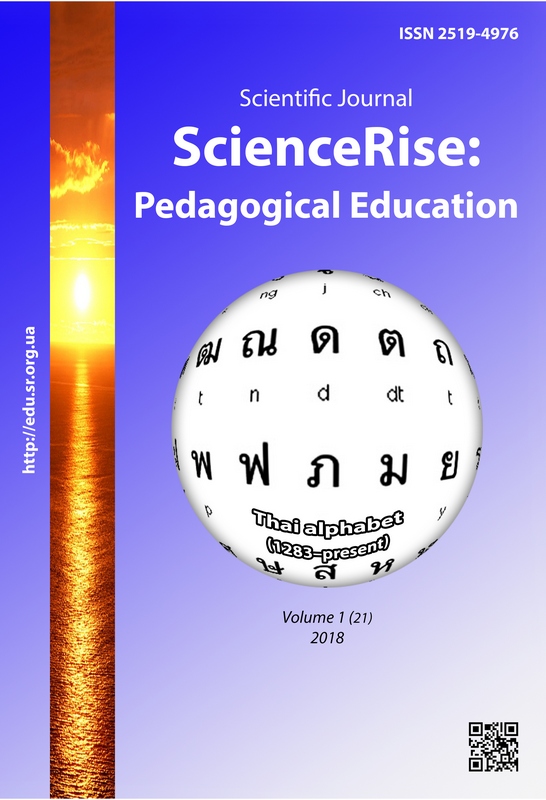Technology for formation of artistic culture of future artists-designers in the process of professional training
DOI:
https://doi.org/10.15587/2519-4984.2018.121404Keywords:
culture, designers, technology, component, training, program, conditions, principles, methodology, structureAbstract
The article actualizes the problem of the improvement of professional training of future artists-constructors, accenting attention on formation of artistic culture of future designers. At the analysis of the scientific literature there was determined the essence and structure of artistic culture of future artists-constructors. Artistic culture of future artists-constructors it is a complicated personal construction that includes the totality of artistic abilities in the art sphere, conscious feelings, motives of artistic activity, readiness to realization of the creative potential through the harmonic transformation of reality and internal world for productive realization of studying and professional functions. There was characterized the methodology of formation of artistic culture of future artists-constructors, grounded on the competence approach, directed on realization of potential possibilities of future specialists, having combined the work for the development of structural components of artistic culture of future designers. This methodology is based on interactive studying technologies, pedagogical conditions, principles of formation artistic culture of future artists-constructors. The methodology of formation is realized through the program of training activities on formation of artistic culture of future artists-constructors. The article contains the structure of activities on formation of the studied phenomenon
References
- Karpova, S. M. (2012). Kryteriyi ta pokaznyky sformovanosti khudozhn'o-profesiynoyi kul'tury maybutnikh arkhitektoriv [Criteria and indicators of the formation of artistic and professional culture of future architects]. Naukovyy visnyk Pivdennoukrayins'koho natsional'noho pedahohichnoho universytetu imeni K. D. Ushyns'koho, 7-8, 8–13.
- Kryts'ka, A. M. (2012). Psykholoho-pedahohichni umovy rozvytku profesiynoyi kompetentnosti maybutnikh dyzayneriv [Psychological-pedagogical conditions of development of professional competence of future designers]. Kyiv, 289.
- Makar, Z. Yu. (2014). Vymohy do profesiynykh znan' i vmin' suchasnykh fakhivtsiv sfery dyzaynu [Requirements for professional knowledge and skills of modern specialists in the sphere of design]. Naukovyy visnyk Chernivets'koho universytetu, 713, 108–116.
- Radkevych, V. O.; Nychkalo, N. H. (Ed.) (2010). Teoretychni i metodychni zasady profesiynoho navchannya u zakladakh proftekhosvity khudozhn'oho profilyu [Theoretical and methodical principles of professional training in the institutions of vocational education of artistic profile]. Kyiv: UkrINTEI, 420.
- Fursa, O. (2011). Rozvytok dyzayn-osvity v Ukrayini i zarubizhzhi: istoryko-porivnyal'nyy aspekt [Development of design education in Ukraine and abroad: historical and comparative aspect]. Porivnyal'na profesiyna pedahohika, 2, 112–124.
- Zeer, E. F. (2004). Modernizatsiya professionalnogo obrazovaniya: kompetentnostnyiy podhod [Modernization of vocational education: a competence approach]. Obrazovanie i nauka, 3 (27), 44–49.
- Yahupov, V. V., Svystun, V. I. (2007). Kompetentnisnyy pidkhid do pidhotovky fakhivtsiv u systemi vyshchoyi osvity [Competency Approach to the Training of Specialists in the Higher Education System]. Naukovi zapysky. Pedahohichni, psykholohichni nauky ta sotsial'na robota, 71, 3–8.
- Pometun, O., Pyrozhenko, L. (2002). Interaktyvni tekhnolohiyi navchannya: teoriya i praktyka [Interactive Learning Technologies: тheory and рractice]. Kyiv, 136.
- Savenko, N. I., Kovhanich H. H. (2009). Prohnostychni oriyentyry innovatsiynoho rozvytku pozashkil'noho zakladu [Prognostic guidelines for the innovative development of an out-of-school institution]. Kharkiv, 256.
- Zaharova, G. I. (2008). Teoriya i metodika psihologicheskogo treninga [Theory and methodology of psychological training]. Chelyabinsk, 44.
Downloads
Published
How to Cite
Issue
Section
License
Copyright (c) 2018 Anton Semenyuk

This work is licensed under a Creative Commons Attribution 4.0 International License.
Our journal abides by the Creative Commons CC BY copyright rights and permissions for open access journals.
Authors, who are published in this journal, agree to the following conditions:
1. The authors reserve the right to authorship of the work and pass the first publication right of this work to the journal under the terms of a Creative Commons CC BY, which allows others to freely distribute the published research with the obligatory reference to the authors of the original work and the first publication of the work in this journal.
2. The authors have the right to conclude separate supplement agreements that relate to non-exclusive work distribution in the form in which it has been published by the journal (for example, to upload the work to the online storage of the journal or publish it as part of a monograph), provided that the reference to the first publication of the work in this journal is included.







